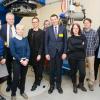A milestone in development of the INTRA-DOSE accelerator
2016.01.28 9:10 - adminAll major technical parameters set by designers of a medical accelerator currently under development within the INTRA-DOSE project have been attained. This is a milestone in development of the Polish Comprehensive System for Intra-operative Radiotherapy. Current state of the project was discussed in detail during a visit paid to Swierk by Professor Julian Malicki, Director of Wielkopolskie Cancer Centre (WCO) in Poznań.
The INTRA-DOSE project run by a collaboration of accelerator physicists, engineers and technicians from NCBJ, physicians and medical physicists from WCO, and some industrial partners (UJP Hitec Systems S.A. and Jarosław Kołcun) has entered a new phase. The two year-long period of study works, design works and time-consuming tests has been successfully concluded. Tests have confirmed that all major technical parameters set as the design objectives have been attained. The parameters include: high dose rates 10…15 Gy/min, broad range of available electron energies 4…12 MeV, dose precision below 0.5%, satisfactory short- and long-term stability. Easiness with which operator will be able to position head of the accelerator is an pretty unique feature that distinguishes the INTRA-DOSE accelerator from other commercially offered units. A high head flexibility is a key feature for intra-operative applications since the accelerator must be easily adaptable to each individual patient. Some innovations introduced by Polish scientists will enable surgeons to properly position the head and to start the radiotherapy within less than 5 minutes.
„Most of the works accomplished in Świerk are highly innovative. The challenges we had to face included optimization of the accelerating structure/mechanical structures/electronic circuitry, and development of dedicated robotic arms/intuitive control and audio-visual system (hardware and software). Several unique solutions have been patented” – pointed out Dr. Agnieszka Syntfeld-Każuch, NCBJ Deputy Director for Innovations and Implementations, Leader of the INTRA-DOSE project – „High technical quality of the obtained therapeutic beam and a very positive evaluation of the entire therapeutic unit formulated by our medical partners from Wielkopolskie Cancer Centre are the best recommendation for our accelerator and strong incentives to further work on innovations that could improve the device”.
The first fully operational unit developed for intra-operative radiotherapy within the INTRA-DOSE project is to be put in operation before the end of this year. After concluding some verification tests we are going to apply for certificates required before the unit can be placed on the market. Know-how acquired during accomplishment of the project and production capacity available in Świerk should enable us to offer the first commercial units to medical centres soon.
„We deeply hope that our accelerator will soon find its applications in hospitals, and will help us to re-build a strong position on the exceptionally competitive market of medical devices” – said Professor Krzysztof Kurek, NCBJ Director General – „We are conducting talks with prospective partners from USA who have already expressed their interest in equipment developed within the INTRA-DOSE project framework. Possible agreement would notably imply that quality of that equipment is good”.
Intra-operative radiotherapy by means of electron beams is among the most modern treatment methods applied to many types of cancers (localized e.g. in breast, head, neck). Combined treatment of such tumours consists in surgery immediately followed by irradiation of the still opened surgical field with an intense beam of high energy electrons. Such combined approach may shorten the entire treatment time by several weeks and simultaneously may increase its efficiency.
The INTRA-DOSE project budget is 8.8 million PLN including 7.3 million PLN grant from NCBiR (National Centre for Research and Development, a Polish government Agency). The project commenced on January 1, 2014, its conclusion is scheduled for the second half of 2016.


















